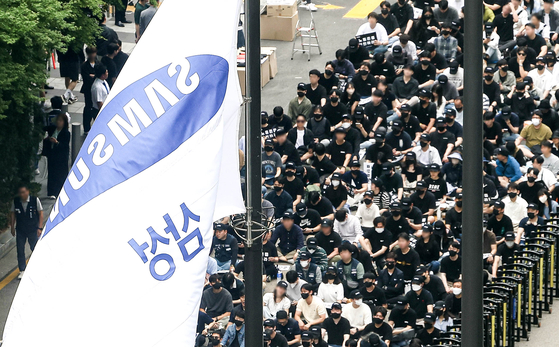June 6, 2024 Update: SEOUL, South Korea
Approximately 28,000 employees of Samsung, confirm that they will go on strike on June 7, sacrificing a day’s pay to do so, according to the National Samsung Electronics Union.
A spokesperson for the union stated, ““We can’t stand persecution against labor unions anymore. We are declaring a strike in the face of the company’s neglect of laborers.” Other news reports said if this strike doesn’t get Samsung to bargain in good faith, a longer general strike could occur.
Despite being Samsung’s inaugural strike in its 55-year history, the company, one of four major players dominating the Korean economy, akin to the “trusts” dismantled by Teddy Roosevelt in the U.S. over a century ago, is notorious for its acrimonious labor relations and frequent violations of labor laws and other regulations. Unionization only commenced in 2020, covering approximately one-fifth to one-fourth of the workforce.
In a dramatic turn of events, Samsung Electronics’ labor union has announced its decision to initiate a company-wide strike following failed negotiations with the tech giant’s management. This move, set to commence on June 7, marks the first-ever strike in the company’s history, raising concerns about potential disruptions to the global semiconductor supply chain.
The decision, which was made public by the union on Monday, comes after prolonged discussions between Samsung’s management and its labor representatives failed to reach a consensus on key issues pertaining to employee welfare and labor rights. According to reports from the BBC, the union alleges that Samsung has persistently neglected the demands of its workforce, prompting this unprecedented action.
With approximately 28,000 union members poised to participate in the strike, representing more than 20% of Samsung’s total workforce, the impact of this industrial action could reverberate across the technology industry. Samsung, a major player in the semiconductor market, plays a crucial role in the supply chain, providing components for a wide array of electronic devices, including smartphones, computers, and appliances.
The union has cited long-standing grievances regarding working conditions, wage disparities, and the company’s alleged suppression of labor rights as primary reasons for resorting to strike action. Despite attempts at mediation, the deadlock between the union and management appears to have reached an impasse, prompting the union to escalate its protest.
In response to the impending strike, Samsung has expressed regret over the union’s decision, emphasizing its commitment to constructive dialogue and the well-being of its employees. However, the company has yet to provide details on contingency plans to mitigate the potential impact of the strike on its operations and the broader semiconductor supply chain.
Industry analysts warn that any disruption to Samsung’s production capabilities could have far-reaching consequences, given the company’s significant market share and its integral role in the global technology ecosystem. The timing of the strike, amidst ongoing supply chain challenges exacerbated by geopolitical tensions and the COVID-19 pandemic, further amplifies concerns about supply shortages and price fluctuations in the semiconductor market.
As the countdown to the June 7 strike begins, stakeholders across the technology industry are closely monitoring developments, hoping for a swift resolution to the labor dispute. The outcome of this standoff between Samsung and its labor union could shape the future trajectory of labor relations within the technology sector and influence the dynamics of the semiconductor market for months to come.
What The Unfolding Labor Dispute Means for the Regular Consumer
The 2024 Samsung labor strike could have implications for global consumers, particularly those reliant on Samsung products and the broader technology ecosystem. Here’s what it could mean:
- Product Availability
The strike may disrupt the production and supply of Samsung’s electronic devices, including smartphones, tablets, and appliances. This could lead to potential shortages in the market, impacting consumers’ ability to purchase or replace Samsung products.
- Price Changes
Supply shortages resulting from the strike could drive up prices for Samsung products, as reduced availability may increase demand and competition among consumers. Additionally, if Samsung faces increased production costs or supply chain disruptions due to the strike, these expenses may be passed on to consumers through higher prices.
- Market Competition
If Samsung struggles to meet consumer demand due to the strike, it could create opportunities for competitors to gain market share. Consumers may turn to alternative brands for their electronic needs, potentially reshaping the competitive landscape within the technology industry.
- Innovation and Product Development
A prolonged strike could hinder Samsung’s ability to invest in research and development or bring new products to market. This could delay the introduction of innovative technologies or features, impacting consumers who are eagerly awaiting new advancements in electronic devices.
- Customer Support and Service
The strike may also affect Samsung’s customer support and service capabilities. With a reduced workforce, consumers may experience delays in receiving assistance with product issues, repairs, or warranty claims, potentially leading to frustration and dissatisfaction.
Societal Insights: Our 5 Important Takeaways from the Labor Strike
The ongoing labor dispute prompts reflection on various issues for both consumers and laborers.
- Importance of Labor Rights
The strike underscores the significance of protecting and advocating for labor rights in the workplace. It highlights the need for companies to prioritize fair treatment, safe working conditions, and equitable compensation for their employees, recognizing that labor rights are fundamental to social justice and economic stability.
- Corporate Accountability
The strike serves as a reminder of the importance of corporate accountability and responsibility. Companies like Samsung have a duty to uphold ethical business practices, respect labor laws, and engage in meaningful dialogue with their workforce to address grievances and concerns. Society expects corporations to act with integrity and transparency, especially when it comes to their treatment of employees.
- Solidarity and Collective Action
The solidarity demonstrated by Samsung employees in organizing and participating in the strike emphasizes the power of collective action in driving social and economic change. It highlights the role of unions and collective bargaining in amplifying workers’ voices, negotiating fair terms, and holding employers accountable for their actions.
- Impact on Supply Chains
The strike’s potential to disrupt Samsung’s supply chain and the broader technology industry highlights the interconnectedness of global markets and the fragility of supply chains. It underscores the need for companies to diversify their supply chains, mitigate risks, and invest in resilience strategies to navigate unforeseen disruptions effectively.
- Consumer Awareness and Influence
The strike raises consumer awareness about the labor practices of companies like Samsung and their impact on workers and society. Consumers have the power to influence corporate behavior through their purchasing decisions, supporting companies that prioritize ethical practices and labor rights while holding accountable those that fall short of these standards.
The Samsung strike prompts society to reflect on broader issues related to labor rights, corporate accountability, supply chain resilience, and consumer activism. It underscores the importance of fostering a fair and equitable workplace environment and holding corporations accountable for their actions, ultimately contributing to a more just and sustainable society.





